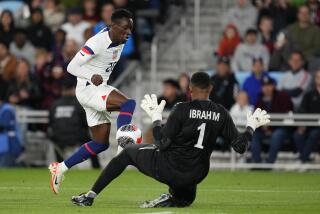<i> Der Kaiser</i> Has Team on a Roll : World Cup: Under Beckenbauer’s unflappable leadership, West Germany now is favored to win the championship.
- Share via
ERBA, Italy — From a medieval castle converted to a luxury hotel, Franz Beckenbauer is carefully planning West Germany’s march to the World Cup final.
In the rugged mountains near Italy’s border with Switzerland, Beckenbauer-- Der Kaiser , as he is widely known--has gathered his young team to prepare for the second round. Having emerged from Group D unbeaten, West Germany (2-0-1) will start the “real” competition of single elimination against the Netherlands Sunday in Milan.
Beckenbauer is guiding his team with the same ethic that served him so well in 12 years as a professional--a combination of grace, discipline, elegance and a keen intelligence applied to technical soccer knowledge. Beckenbauer is perhaps the tournament’s best-known coach, and in three weeks of pressure-filled matches and daily media interrogations, he has come out unruffled, as always.
More than 100 reporters, most of them German, are squeezed into a glass-enclosed room at the Hotel Castello de Casiglio, the West German team’s training camp. The room is hot even before television lights are turned on for Beckenbauer’s arrival.
The coach is lean, tanned and comfortable. He doesn’t perspire. Even after almost an hour of questions--some of them repeated several times--Beckenbauer sits and smiles. Take it as grace under pressure, a hallmark of Beckenbauer the player. West Germany has now been made the 9-4 favorite to win the World Cup by London bookmakers. It is the first time in almost a year that a team has surpassed Italy as the favorite.
And it is Beckenbauer who has engineered the rise.
In 1984, Beckenbauer took over a West German team that had made a disappointing showing in the European Championships and, in two years, took it to the World Cup final in Mexico City.
Under his guidance, West Germany also reached the semifinals of the European Championships in 1988--losing to the Netherlands--and qualified for this World Cup from a difficult group.
To the soccer world, Beckenbauer’s name has been synonymous with success. He was a 21-year-old midfielder on the team that lost to England in the 1966 World Cup final, a member of the team that finished third in 1970 and the captain of the West German team that won the World Cup in 1974.
Americans may remember Beckenbauer from his days in the now-defunct North American Soccer League. He led the New York Cosmos to three national titles in the 1970s and managed, as well as any player before him--Pele included--to popularize the game in the United States.
Despite his reputation abroad and at home, Beckenbauer’s appointment as coach of the national team was criticized by West German club managers because he didn’t have a coaching license.
This breach of procedure was cleared up last year when the German soccer federation awarded Beckenbauer a license for his years of service to the sport.
Such niceties are more than minor issues in West Germany, where coaches are as regulated and structured as players. The German system seems to be working: In its 90 years, the West German Football Federation has had only seven presidents and five coaches. Stability may be boring, but it’s successful.
The turnover rate will rise slightly next month, because Beckenbauer, 44, has announced that he will step down as national coach after the World Cup.
In his six-year tenure, Beckenbauer has presided over a time of change in the sport, both in West Germany and elsewhere.
It is generally assumed that this will be the last World Cup competition for a divided German team. But while a political merger of the two nations is on the horizon, a consolidation of sporting power is proceeding more slowly.
The plan is to allow East German club teams into the powerful West German Bundesliga in 1992. Beckenbauer figures that even if a united Germany had pooled its players, only three or four East Germans would have been good enough to make his 22-man roster.
“The situation is perfect to bring both countries together as one,” Beckenbauer told an American reporter Friday, moving from German to flawless English. “Our national team will get a better selection, a better pool of talent to draw from. The East Germans have some good players.”
Even before the Berlin Wall fell, a handful of East German soccer players were heading West. The three best East Germans--Andreas Thom, Ulf Kristen and Mattias Sammer--have all signed with West German clubs.
Thinking ahead to the 1994 World Cup, Beckenbauer likes the image a combined East and West German soccer pool conjures up--competition.
“OK, maybe there are some disadvantages (for the West German players),” he said. “Some are going to be afraid to lose their jobs, but that is how the world is.”
West German defender Thomas Berthold agrees that West German soccer is about to experience a flood of East German players.
“But it’s not a problem for me,” Berthold said. “I play in Italy. Maybe in four years it will be a problem, to qualify for the World Cup team. Maybe the federations will unite, too. But right now, football in the East is not on the same level as on the West side.”
As for his own future, Beckenbauer was vague. He spoke of possibly taking a marketing job with the West German Football Federation. But the most persistent scenario has Beckenbauer returning to the United States, either in a position with the U.S. Soccer Federation or with the 1994 World Cup Organizing Committee.
Beckenbauer deflected speculation that he might replace U.S. Coach Bob Gansler, who has four years left on his contract.
“Bob Gansler is a good coach,” Beckenbauer said. “The last time I saw the U.S. Soccer Federation officials was in Stockholm in February. We are friendly, but no one has offered me anything. If they want something from me, they come to me and ask me. . . . They have not asked me.”
Beckenbauer repeated this so many times, it appeared that he, too, was surprised that U.S. officials had not sought out one of soccer’s most eloquent spokesmen.
“If they want to prepare for 1994, they have to start now,” Beckenbauer said of U.S. plans for staging the next World Cup. “Four years is a long time, but to develop an organization, it’s not a long time.”
Beckenbauer didn’t rule out working in marketing for the 1994 World Cup. Who would be better at selling the game in soccer’s wasteland than one of the sport’s best players?
“I don’t know,” Beckenbauer said, frowning, “I tried to do that 10 or 15 years ago. Maybe now is another chance. It’s a wonderful sport.”
More to Read
Go beyond the scoreboard
Get the latest on L.A.'s teams in the daily Sports Report newsletter.
You may occasionally receive promotional content from the Los Angeles Times.







